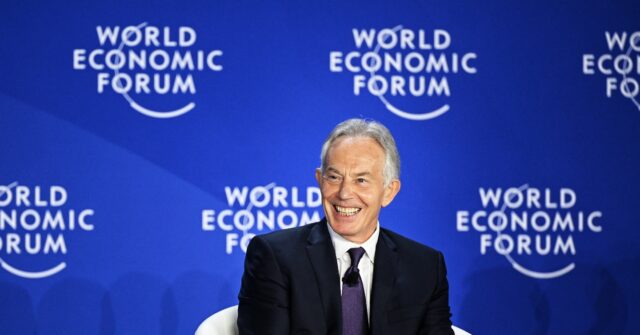Former British Prime Minister Tony Blair may be tasked with a governing role in a potential post-war Gaza should the Islamist Hamas terrorists agree to a framework proposed by U.S. President Donald Trump.
According to a 20-point peace plan released by the White House on Monday, Washington would seek to replace Hamas with a “new international transitional body” to run the Gaza Strip until a Palestinian government can be put in place. Dubbed the “Board of Peace”, the body would be chaired by President Trump.
The plan stated that “other members and heads of State” would be announced later. However, in addition to Trump, the only other named figure included in the statement was Tony Blair, suggesting that the former UK Prime Minister may be set for a leadership role in the process.
Since leaving office in 2007 after a ten-year tenure in Downing Street, Blair has continued to be active on the world stage, particularly during the Chinese coronavirus crisis, when he emerged as a leading advocate of lockdowns and vaccine mandates. He has also been active in the Middle East through his globalist Tony Blair Institute non-profit, which has developed close ties in Saudi Arabia, the United Arab Emirates, and Israel.
The former Labour PM also had more formal diplomatic roles in the region, including serving for eight years as an envoy for the so-called “Quartet” of the United States, United Nations, European Union, and Russia grouping, which sought to craft a peace deal between Israel and the Palestinians.
His previous position, as well as his prospective role in a post-war Gaza, have come with considerable controversy, with those aligned with various Palestinian factions pointing to his connections in Jerusalem and his role as one of the chief architects of the second Iraq War.
Blair’s potential appointment may also evoke the UK’s historical role in the region, notably the British Mandate, which saw London take control over the area from the Ottoman Empire in the wake of the First World War until 1948 when the state of Israel was established.
General Secretary of the Palestinian National Initiative, Mustafa Barghouti, told the Washington Post: “We’ve been under British colonialism already… He has a negative reputation here. If you mention Tony Blair, the first thing people mention is the Iraq War.”
Conversely, an unnamed Israeli official is quoted by the paper as saying: “Trump has incorporated some of Blair’s thinking into his… peace plan. It has to be someone acceptable to all sides. The Israelis really like Tony Blair.”
Scepticism was also aired in Blair’s native Britain from diverse ends of the political spectrum. On the far-left, former Labour leader Jeremy Corbyn said that Blair’s “catastrophic decision to invade Iraq cost thousands upon thousands of lives” and therefore he should not “be anywhere near the Middle East, let alone Gaza.”
Corbyn, who was ousted from the Labour Party over antisemitism scandals as now Prime Minister Starmer purged the party of his hard-left internal rivals, added: “It is not up to Blair, Trump or Netanyahu to decide the future of Gaza. That is up to the people of Palestine.”
On the other end of the spectrum, former Conservative MP Andrew Bridgen said, “President Trump has got this one seriously wrong. Tony Blair is despised by the majority of British Citizens and has a very poor record in the Middle East after his illegal Iraq war.”
Despite coming from a starkly different worldview, President Trump paid tribute to Blair on Monday, describing the former PM as a “very good man”.
For his part, Blair issued a statement on Monday praising President Trump’s “bold and intelligent plan, which, if agreed, can end the war, bring immediate relief to Gaza, the chance of a brighter and better future for its people, whilst ensuring Israel’s absolute and enduring security and the release of all hostages.
“It offers us the best chance of ending two years of war, misery and suffering and I thank President Trump for his leadership.”
Regardless, any potential role for Blair in the peace process will be dependent on Hamas agreeing to the framework offered by President Trump, including releasing all remaining Israeli hostages, laying down its arms, and giving up power over Gaza. Should the Islamist group refuse to do so, it may give further justification for Jerusalem to continue its military operations in Gaza to root out terrorists responsible for the October 7th terror attacks.
Follow Kurt Zindulka on X: Follow @KurtZindulka or e-mail to: kzindulka@breitbart.com
Read the full article here


